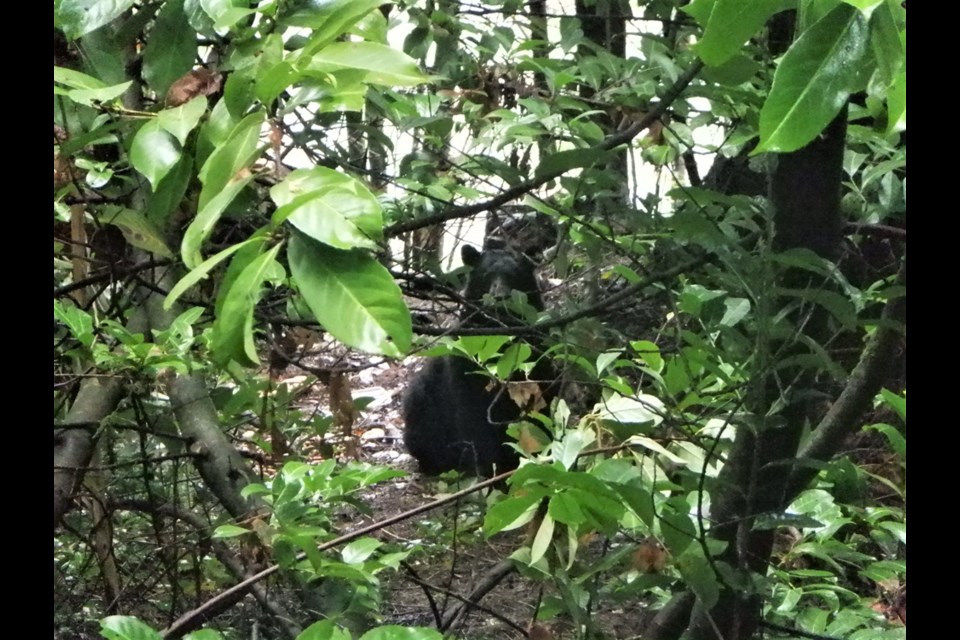The BC Conservation Officer Service says charges are pending against a West Vancouver man alleged to have been deliberately feedings bears and coyotes in a West Vancouver park area.
Sgt. Simon Gravel of the Conservation Officer Service said investigators intercepted the man in his 50s in the act of allegedly leaving food out for the wildlife on Friday. Gravel said officers believe the man had been feeding multiple bears and coyotes in the public park for months.
Gravel said the investigation started after a member of the public witnessed the man’s activity and called to report it. Investigation revealed “it happened on an ongoing basis for a period of time,” said Gravel.
“We’re not talking about a tourist who was walking by and getting a selfie,” he added.
The man was co-operative with conservation officers, said Gravel.
Gravel said the park area has since been cleaned up and conservation officers don’t feel the wildlife present a threat to public safety. None of the bears or coyotes that had been fed by the man had to be relocated or destroyed, he said.
The Conservation Officer Service is now recommending charges of feeding dangerous wildlife, which the B.C. Wildlife Act defines as bears, cougars, coyotes or wolves. The offence carries a maximum fine of $100,000.
Gravel said he couldn’t say what prompted the man to start feeding the wildlife. In many cases, those actions stem from a misguided attempt to care for wildlife, he said.
Gravel said that’s never a good idea.
Feeding wildlife: illegal and dangerous
“We understand that people want to care for animals. I think we can all relate to that. But feeding wildlife is not good for the welfare of the animal,” he said. “It's not good for public safety. It is ultimately illegal, and you can be fined up to under $100,000, under the Wildlife Act.”
Gravel said when wildlife is fed, it can change their behaviour to make them more aggressive in attempts to get more food.
“It’s well documented that feeding wildlife can be a serious contributing factor to behavioural change in wildlife. We saw that in Stanley Park, for example, that the direct feeding and indirect feeding [of coyotes in the park] is definitely a strong factor that changed the behavior of animals.”
Gravel said the issue of people feeding wildlife is an ongoing concern for conservation officers. “We’ve had multiple cases the last few years,” he said.
“That's why we're talking about that case, is to make sure that people that really understand this is not a good way to care for wildlife. And it's illegal. And we're very motivated to hold people accountable for such behaviour.”
Bears and coyotes active on North Shore
Both bears and coyotes are active on the North Shore right now, said Gravel. Coyotes are caring for pups at this time of year and are particularly active, he said.
“I think we have more calls now for coyotes than for bears,” he said, adding the case last year in which coyotes in Stanley Park aggressively tracked people has put them on the public radar. But that was a very unique situation, he added, caused by coyotes that had become highly habituated to being fed by humans.
Last October, a Whistler woman, Zuzana Stevikova, received a $60,000 fine for feeding bears from her Kadenwood home in the summer of 2018. The Conservation Office Service said was the highest overall penalty ever imposed under B.C.'s Wildlife Act.
In 2020, charges were also laid against a West Vancouver man, Vitali Shevchenko, following an investigation into allegations that members of a North Shore family had been feeding bears in their backyard. The charges came two years after videos posted on social media showed a family who appeared to be from the North Shore feeding a mother bear and her cub in their backyard.
Shevchenko is due back in court on those charges in August.
Wildlife and other environmental offences should be reported to the RAPP hotline at 1-877-952-7277.
-with files from Brent Richter





